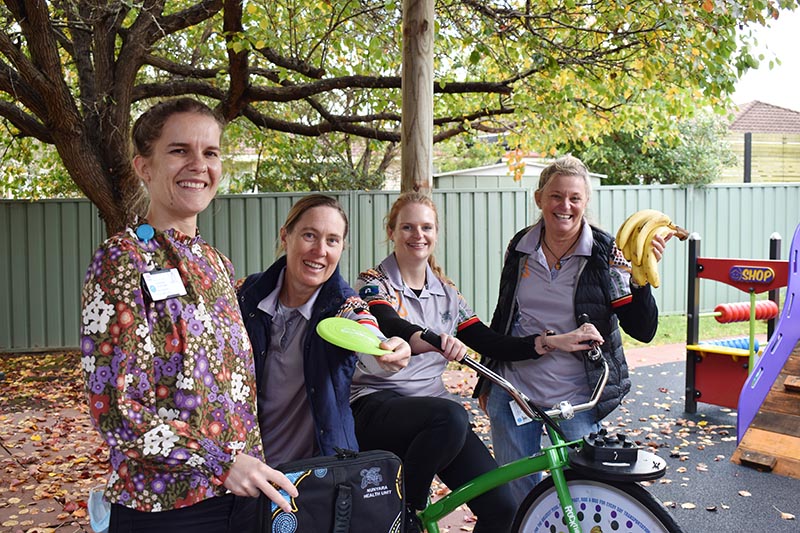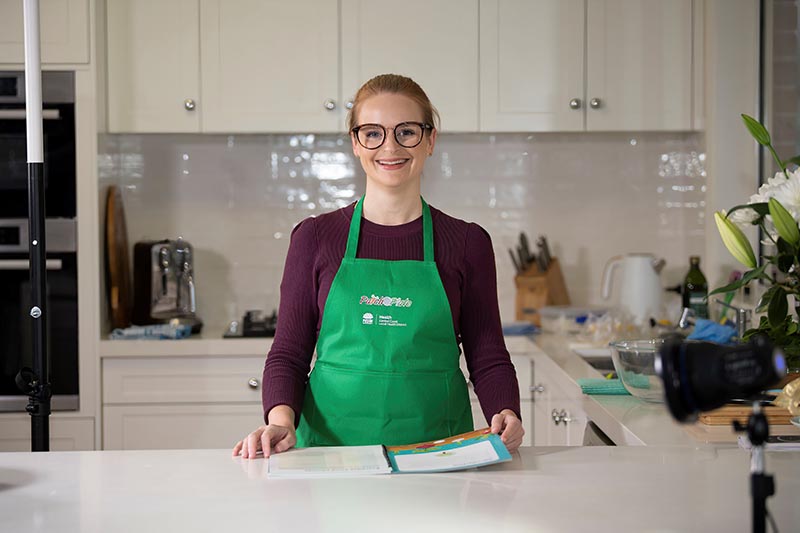
NEWS THAT MATTERS
Better health outcomes
for the Central Coast
Only around a quarter of an individual’s health is impacted by the health system. This leaves other factors such as political, economic, environmental, social, cultural, behavioural and biological factors collectively bearing a much greater impact. The Central Coast Health Promotion Service aims to influence these factors in a positive way.

The Health Promotion team at Healthy Jarjums, an award-winning kindergarten health screening program for Aboriginal children.
10 May 2023
HEALTH promotion is the process of enabling people to increase control over the determinants of health to improve their health and wellbeing. It focuses on addressing and preventing the root causes of ill health rather than just treatment and cure. This involves looking beyond individual behaviour, towards a wide range of social and environmental interventions.
Approximately a quarter of an individual’s health is impacted by the health system, which leaves other factors such as political, economic, environmental, social, cultural, behavioural and biological factors collectively bearing a much greater impact.
The Central Coast Health Promotion Service aims to influence these factors in a positive way, creating supportive environments for our communities that promote good health and wellbeing across life’s journey. It works across the priority areas of tobacco, alcohol, healthy eating and active living, healthy built environment and falls prevention.
The service ensures the public and its partners are supported via healthy lifestyle programs and projects, timely and valuable information and innovative resources to improve health outcomes for people living on the Coast.
Alongside facilitating NSW Health state-wide programs locally, Central Coast Health Promotion delivers additional bespoke projects to further meet the needs of the Central Coast. These include its Lunchbox Connection program to tackle food insecurity amongst Aboriginal students and their families in disadvantaged areas, the Thirsty? Choose Water! program to encourage children to choose water over sugary drinks, and the Say No to Vaping campaign to address the growing number of teens using up e-cigarettes.
The service also works with partners in the community, across the health and social care system and wider to advocate for changes in the laws, regulations, policies, institutional practices and standards that influence the personal health choices of large numbers of individuals and the environments in which these are made.
Those people and the areas in which they can help to provide better health outcomes are:
Nutrition / healthy eating habits / fast food
Dietitians Nina Kingon, Lesley Marshall and Katie Booth can provide advice on food and nutrition and comment on healthy eating habits, obesity rates and the fast food industry. Nina can also talk about the work of the Service to help tackle sugary drink consumption
amongst school children through its Thirsty? Choose Water! program.

Health Promotion Officer and dietitian Nina Kingon.
Early childhood development
Health promotion officer and former early childhood teacher Jasmin Wing oversees the implementation of NSW Health’s Munch & Move program for Central Coast early childhood services including family day care.
This includes a Healthy Menu Review scheme, developed in conjunction with the District’s Nutrition Services team, to ensure early childhood education service menus are nutritionally adequate. Jasmin can discuss the importance of introducing healthy habits including nutrition, physical activity, and fundamental movement skills and reduced screen time during early childhood.
Jasmin also delivers the Move like a Mariner program, working with the Central Coast Mariners to teach fundamental movement skills to children on the Coast.
Healthy canteens
Chad Partridge, Nina Kingon, Lesley Marshall and Katie Booth can discuss the Health Promotion Service’s work alongside Nutrition Services to support canteens in primary, secondary and independent schools in ensuring their canteen menus are healthy and pass
Smoking and vaping
Tobacco project officer Leanne Andrew can discuss a number of areas related to smoking and vaping, including:
- Smoking rates on the Central Coast.
- The health impacts of smoking and the positive impact quitting can have on your physical and mental health.
- The health impacts from vaping, increase in e-cigarette use amongst young people and the work the Service is doing with local schools and organisations to tackle this, including its Vaping Sales to Minors work to monitor sales of vapes to under 18s in convenience stores on the Coast.
- The laws, including:
- smoking and vaping-free public places to protect people from the harms of second-hand smoke and aerosol from e-cigarettes.
- the impact of recent changes such as making nicotine e-cigarettes prescription only.
- Spotting the signs of nicotine addiction and support available
Alcohol industry and alcohol in the community
Health Promotion and Population Health Director Niki Kajons can discuss:
- Liquor license applications on the Central Coast and the links between availability of alcohol and increased levels of alcohol consumption and associated harms including, but not limited to, assault, family violence and poor health outcomes.
- Underage drinking and the Service’s work with retailers and Liquor & Gaming NSW to reduce this through its Alcohol Sales to Minors project.
- The alcohol industry’s digital marketing tactics, children’s exposure to harmful alcohol advertising and reporting inappropriate advertisements.
• Health impacts from drinking generally.
Staying active and independent in older age
Health promotion officer Samantha Hingerty and geriatrician Tomiko Barrett can discuss the importance of remaining active and healthy in older age to help maintain independence and reduce risk of falls. Samantha can discuss:
- Local community and online programs that support older adults to get active and eat well.
- Simple exercises you can do in the home to improve strength and balance.
- Other areas that promote good balance and overall health like managing your medications, looking after your eyesight and hearing, strong feet and the correct footwear.
Active transport
Active transport or active travel refers to any type of travel that involves being physically active, such as walking, cycling and incidental activity associated with using public transport. Regular physical activity has important health benefits such as reducing your risk of type 2 diabetes, heart disease and some cancers, as well as preventing unhealthy weight gain, improving mental wellbeing and building strong bones and muscles.
An avid bike commuter and active transport advocate, Nigel Tebb can discuss first-hand the physical and mental health benefits of ‘going active’ along with initiatives that workplaces can implement to promote active travel. For example, improving access to active travel options and providing end-of-trip facilities such as lockers and change rooms.
Nigel oversees the District’s Go Active 2 Work initiative, which has been running for more than a decade and aims to get more adults active by increasing the use of active modes of transport to and from work.
Healthy built environments
The environments in which we live can have a major impact on our health. There is strong evidence demonstrating the links between chronic disease and lifestyles characterised by car-dominated transport, reduced opportunities for physical activity and lack of social connection.
For more than 15 years the Health Promotion Service has advocated for environments that protect and promote the health and wellbeing of the Central Coast community, or more specifically, the planning, design, development and management of places, which support people to lead physically active, well nourished, socially connected and healthy lives. Advocacy usually takes the form of written submissions in response to regional and state significant policies, plans, development proposals, etc. Nigel Tebb has been a mainstay of this work on the Coast and can discuss how the built environment can support people to lead healthy lives.
Healthy wellbeing program
There are a number of free healthy wellbeing programs facilitated by Central Coast Health Promotion Service. They include:
Go4Fun – a 10-week healthy wellbeing program for children aged 7 to 13 who are above a healthy weight to enjoy along with their families. Run by trained health and community professionals, it’s a fun way for kids to build self-esteem and learn about eating well, staying active and living a healthy life.
Programs run every term at locations across the Central Coast, kids enjoy group activities and games, rewards and prizes and making new friends, while families benefit from professional tailored advice about healthy eating and positive health changes. Health promotion officer Joel Bunn can discuss the program, its benefits and the positive impact it is having on children and families on the Coast.
Get Healthy – a telephoned-based coaching service that supports adults aged 16 and above to make positive lifestyle changes. Qualified health coaches work with people on a one-to-one basis, providing practical tools and supporting them to set achievable goals, make-a-plan (starting with small steps) and overcome barriers that stand in their way.
Support can be in any number of areas including healthy eating, becoming more achieve, reaching and achieving a healthy weight, reducing alcohol intake, and staying healthy during pregnancy.
Health promotion officer Samantha Hingerty can discuss the program and the benefits participants are seeing.







.jpg?crc=4257584689)










_web.jpg?crc=282450513)



